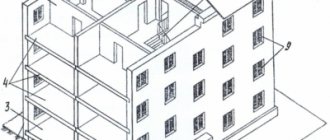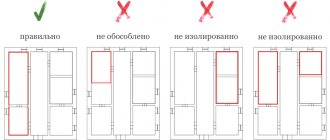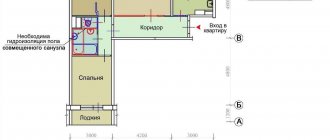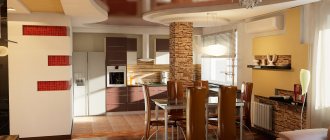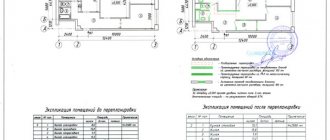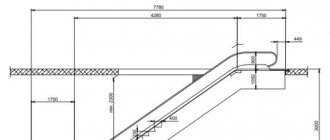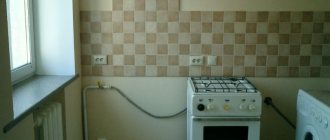Very often situations arise when it is necessary to carry out redevelopment in non-residential premises. In such cases, it is very important for the owner not to engage in amateur activities and to collect all the necessary documents that will be needed to obtain permission to carry out redevelopment work. Doing them without permission is illegal and such actions can lead to very disastrous consequences. Let's take a closer look at what non-residential premises are.
Non-residential premises - this term refers to any premises that are not intended for permanent residence, such as offices, shops, etc. They can be separately located or located in multi-apartment residential buildings. The list of permitted redevelopment works greatly depends on this.
What work does not require a permit?
There are many renovations that do not require a permit. When performing them, the integrity of the building should not be violated and the design plan should not be changed, that is, all walls and partitions must remain in place and in complete integrity. Let's look at the list of repair work that can be done without permission:
- wallpapering or painting walls;
- plastering or leveling walls with putty;
- replacing or painting the flooring;
- any type of cosmetic work that is carried out on the external walls of the building;
- replacement of windows or doors, etc.
These repairs are aimed at maintaining the building in good appearance, which is not prohibited by law and does not apply to redevelopment.
What types of work are considered redevelopment in non-residential premises?
It is very difficult to list all types of work that are considered redevelopment in non-residential premises, let’s consider the most common:
- displacement of any partition;
- violation of the integrity of the wall;
- extension of any building;
- project change;
- increasing the internal space by removing the wall;
- dividing the room by erecting a partition;
- adding a separate entrance/exit by destroying a wall, etc.
All of the above types of repair work relate to redevelopment, and their implementation requires mandatory permission from special authorities. The location of non-residential premises is also of great importance. If it is detached, obtaining permission for redevelopment is much easier than if it is located in residential buildings.
Redevelopment in separately located non-residential premises
For owners of non-residential premises that are located as a separate building, obtaining permission for redevelopment is much easier. Let's look at all the steps step by step:
- first, the owner needs to develop a redevelopment plan, which is carried out by a highly qualified specialist;
- a specialist assesses the condition of the building itself, its walls and the possibility of carrying out the desired redevelopment;
- then the specialist draws up a drawing with the redevelopment, as well as a description of the materials that will be used to implement it;
- after completion of the design work, the owner receives a ready-made plan;
- the owner submits a redevelopment plan to the MFC or to the public services portal, along with an application and documents establishing ownership;
- is waiting for a response from the government agency about the possibility or prohibition of carrying out work on redevelopment of non-residential premises.
Redevelopment approval options
Specialists familiar with the procedure for approving major repairs identify several options for approving redevelopment:
- According to the project. The most difficult approval option, requiring preliminary design of repairs performed by professional specialists. The project is necessary if, during the renovation of the building, it is planned to carry out work on load-bearing partitions, create openings in walls or ceilings, or change installed communications. If you plan to carry out complex renovations in an apartment, sometimes you may need to first obtain permission for redevelopment from the author of the house project.
- According to the sketch. The second approval option, which is considered simplified. It involves creating a sketch for redevelopment, according to which it is allowed to: dismantle and move existing non-load-bearing partitions, install new partitions that do not increase the load on the structural elements of the building, replace individual elements of engineering systems or equipment with similar ones.
- Repair without approval. Sometimes redevelopment of non-residential premises can be carried out without prior approval from the responsible authorities. Most often, without a project and approval, only cosmetic repairs in buildings are allowed, which does not affect the structural and engineering characteristics of the premises and can rarely be considered a full-fledged redevelopment.
Legislative requirements in the field of redevelopment approval are different for different buildings and structures. The most stringent requirements apply to non-residential premises located on the first floors of multi-apartment buildings. They are due to the fact that any problems in such premises can negatively affect a large number of residential properties at once and can harm many people.
In the premises of detached non-residential buildings, it is much easier to carry out major repairs, since the reliability and functionality of only one building will depend on its quality. And other owners will not suffer because of mistakes made during redevelopment.
Redevelopment of non-residential premises in a residential building
Owners of non-residential premises located in a residential building receive permission for redevelopment much less often than in the first case, because when one wall is displaced, the load on the entire building changes and this can lead to bad consequences. In this case, it is very important to find a highly qualified specialist to develop a redevelopment plan, because the decision of the government agency largely depends on this. The specialist carries out a number of works in order to create the correct redevelopment plan, for example:
- assesses the condition of the building walls;
- directly at the location of the building and all the necessary documentation, assesses the possibility of moving a wall or expanding the room;
- creates a sketch of the proposed redevelopment and agrees with the owner.
After all work has been carried out at the site, the specialist creates a detailed plan for the redevelopment of non-residential premises and transfers it to the owner.
Further, all actions are performed by the owner himself. He collects all the necessary documentation and, together with the redevelopment plan, submits an application to the MFC during a personal visit or electronically through the public services portal, attaching photocopies of the entire package of documents. Upon completion of the review of the application, a positive or negative response will be issued.
Coordination of redevelopment of non-residential premises
Redevelopment is a set of renovation works that are aimed at changing the layout of rooms, the design and engineering of premises for various purposes.
Such changes must be recorded in the technical documentation for the facility, stored in the BTI archives. Most often, changing the characteristics of buildings requires prior approval from the responsible authorities, who check whether design solutions comply with current legislation and whether they are safe to implement in practice. Owners sometimes refuse to make drastic changes to the interior premises, not wanting to go through the procedure of approving project documentation with government services. Such events require considerable effort, time, and sometimes financial costs. At the same time, owners should be aware that there are certain types of redevelopment of non-residential premises that do not require approval; they can be implemented according to the project without submitting the project for inspection to government agencies.
Procedure for permitting redevelopment in non-residential premises
After a special state body has issued a permit to carry out redevelopment in a non-residential premises, the owner must begin to implement it as quickly as possible, because the permit is valid for 12 months, and after this time it is canceled and it will be impossible to carry out work. Let's look at the owner's action plan step by step after receiving permission to carry out redevelopment:
- first of all, it is necessary to find a highly professional team of workers who will carry out the redevelopment work;
- it is very important to carry out everything in accordance with the project plan according to which the redevelopment was approved; even a slight deviation from it may lead to unexpected expenses, because the commission that will accept everything will not approve the work performed;
- upon completion of construction work, the owner is provided with a work completion certificate, which indicates all the actions performed and materials used in the redevelopment;
- with the received act, the owner applies to the BTI with an application to make changes, after which a commission is appointed;
- the commission checks whether the redevelopment was carried out in accordance with the approved plan, takes measurements and compares everything, after which they give their conclusion;
- if everything was done in accordance with the design plan and no mistakes were made, the owner after a certain time receives from the BTI an approved new design plan for the non-residential premises;
- after this, the owner applies to the MFC with an application to obtain a new cadastral passport for non-residential premises with the redevelopment carried out.
What to do if you receive a refusal to redevelop a non-residential premises
If the owner has created a project plan in accordance with all laws that allow the redevelopment of non-residential premises, and has also collected all the necessary documents, but the government body made a negative decision and prohibited this procedure, he can go to court and thus obtain permission.
What is necessary to obtain permission to reconstruct non-residential premises in court:
- a project plan for redevelopment, which was created by an experienced specialist, because a lot depends on it;
- all documentation confirming the applicant’s ownership of non-residential premises;
- if a non-residential premises has several owners, then written consent for redevelopment is required from each;
- written refusal to carry out redevelopment from a government agency;
- statement from the owner.
After submitting the entire package of documents to the court, a hearing takes place and a decision is made. If the decision is positive, the owner receives a document that obliges the state body to issue permission to redevelop the non-residential premises. After which, the owner can begin to implement it.
An example of a redevelopment project for non-residential premises
Back
Forward
Despite the fact that the preparation of a project for redevelopment of premises requires time and financial costs, it is almost impossible to do without it if the owner wants to carry out complex major repairs in the building. To determine the cost of professional services in the field of refurbishment and redevelopment of objects, you can use a calculator.
What to do if the redevelopment of non-residential premises was done without permission
There are quite a few cases when owners began redevelopment without obtaining permission to do so. This is illegal and can lead to a lot of trouble. For example, the owner will not be able to sell or issue a deed of gift for non-residential premises in which illegal redevelopment was carried out. In this case, it must be legalized. What is needed for that:
- it is necessary to create a design plan for the finished redevelopment;
- obtain a written expert opinion on the safety of the redevelopment;
- collect all documents confirming the applicant’s ownership of non-residential premises;
- collect all documents for non-residential premises, such as a cadastral passport, a project plan before redevelopment, etc.;
- a statement from the owner, if he is not the only owner of the non-residential premises, then written consent for the redevelopment will be required from everyone.
After the owner has collected the entire package of documents, he submits them to the MFC with a statement indicating a request to recognize the redevelopment of the non-residential premises as legal. The application is submitted in person to the MFC or in electronic format through the government services portal, in this case it is necessary to attach copies of all documents.
Very often, almost always, the owner’s application receives a negative decision; in this case, it is necessary to go to court with all the documents and a written refusal.
If the court makes a negative decision and recognizes the redevelopment of non-residential premises as impossible, the owner is obliged to return it to its original appearance as soon as possible.
In addition, the owner is fined for carrying out illegal redevelopment. But this is not the most severe punishment, there are worse ones. For example, if, after the reconstruction of a non-residential premises located in an apartment building, partial or complete destruction occurred, and even worse, with human casualties, the owner, in addition to a fine, will also receive criminal punishment, depending on the degree of damage received. Therefore, there is no need to rush and it is better to spend a little time, but do everything in accordance with the law.
Redevelopment
Redevelopment is a change in the configuration and area of a room, which is recorded in the technical passport. Redevelopment of apartments, houses and other premises can be carried out by both individuals and legal entities - the approval procedure is identical for them.
! According to the Housing Code of the Russian Federation, any reconstruction and redevelopment of premises requires approval and legalization. All changes made are reflected in the registration certificate for the premises, which is issued by the BTI after the inspection, and must also be registered with Rosreestr.
It is necessary to legalize redevelopment before conducting any real estate transactions:
- sale,
- donation,
- use as collateral,
- privatization of real estate.
The Moscow Regional BTI carries out:
- legal advice on reconstruction and redevelopment issues;
- preparation of projects for repair and reconstruction of existing buildings;
- preparation of projects for redevelopment of premises;
- support of the approval procedure;
- three-dimensional architectural design and modeling of houses, cottages, shopping and office centers, open-plan apartments, engineering facilities, communications.
Coordination and legalization of redevelopment
Before starting renovation work to change the configuration of the premises, it is necessary to obtain permission from the Department of Architecture and Urban Planning, that is, agree
redevelopment of apartments and other types of real estate. To do this, it is necessary to prepare a redevelopment project, which will reflect the planned changes.
For a number of changes, work can only be carried out after approval of the redevelopment; if this is not obtained, there is a high probability that after the repair it will not be possible to legitimize the changes made. If the administration or housing inspectorate finds out about illegal redevelopment, the owner faces a fine and a decree on the mandatory restoration of all changes made to their previous form. If it is impossible to carry out restoration work at the expense of the owner, the property may be put up for auction.
If the redevelopment of an apartment or other premises was carried out without approval, and there are no violations of construction requirements and standards, the change in configuration can be legalized
upon completion of repair work.
Redevelopment of premises with approval is carried out as follows:
1. Preparation and approval of the redevelopment project
2. Carrying out repair work in accordance with the agreed project
3. Coordination of the completed redevelopment with the administration and registration of a technical passport for the premises with the new configuration
4. Putting an apartment or other premises into operation with new characteristics of the object.
! The redevelopment project is carried out by design organizations licensed by SRO. The document is carried out on the basis of current legislation, building codes and regulations, depending on the purpose of the object and the work being carried out. After drawing up, the redevelopment project is signed by the chief project engineer (CIP) and the chief project architect (CAP) who completed the project.
The Moscow Regional BTI develops and prepares project documentation to approve the project and legitimize the illegal redevelopment of residential and non-residential premises, prepares an act on the completed redevelopment and submits documents with updated information for registration to Rosreestr.
To prepare documentation for approval
redevelopment of an apartment and other premises requires the following package of documents:
1. Technical passport before redevelopment
2. Sketch (project) of the desired redevelopment
3. Title documents
To legitimize
already carried out redevelopment, the following documents are required:
1. Technical passport before and after redevelopment
2. Redevelopment project
3. Title documents
Document preparation period – from 10
working days.
! Before concluding a contract for the provision of work on the coordination and legalization of redevelopment, MOBTI specialists must familiarize themselves with the planned or already made changes . If violations of building rules and regulations are found, no work will be carried out.
You can order approval or legalization of the redevelopment of an apartment and other premises in MOBTI as follows:
► in one of the MOBTI branches or Consulting Centers throughout the Moscow region
► by phone hotline +7
Advantages of the Moscow Regional BTI:
► Extensive experience in the field of property and land relations. MOBTI has been providing real estate services since 1927.
► Moscow Regional BTI is a state institution that can guarantee the quality of the services provided. If controversial issues arise, MOBTI is ready to provide assistance and assistance to its customers.
► All MOBTI specialists carrying out cadastral, geodetic and other work have the necessary qualifications, experience and are members of specialized SROs
► The Moscow Regional BTI carries out all types of cadastral and inventory work. MOBTI provides about 70 services
in the field of registration, registration, assessment, translation and examination of real estate.
► Having your own archive of more than 3.8 million
real estate objects
► Modern equipment, own vehicle fleet.
► More than 100 reception points
throughout the Moscow region.
► Providing legal advice on reconstruction and redevelopment issues
► Employees of the State Budgetary Institution of the Moscow Region “MOBTI” are members of the majority of commissions of local government bodies of the Moscow Region that make decisions on the approval of the reconstruction and redevelopment of premises.
► Provision of services at the place of application, and not at the location of the property
► Free on-site reception and transmission of documents throughout the Moscow region
► Availability of an office in the center of Moscow, 3 minutes from Mayakovskaya metro station: Oruzheyny Lane 15A
